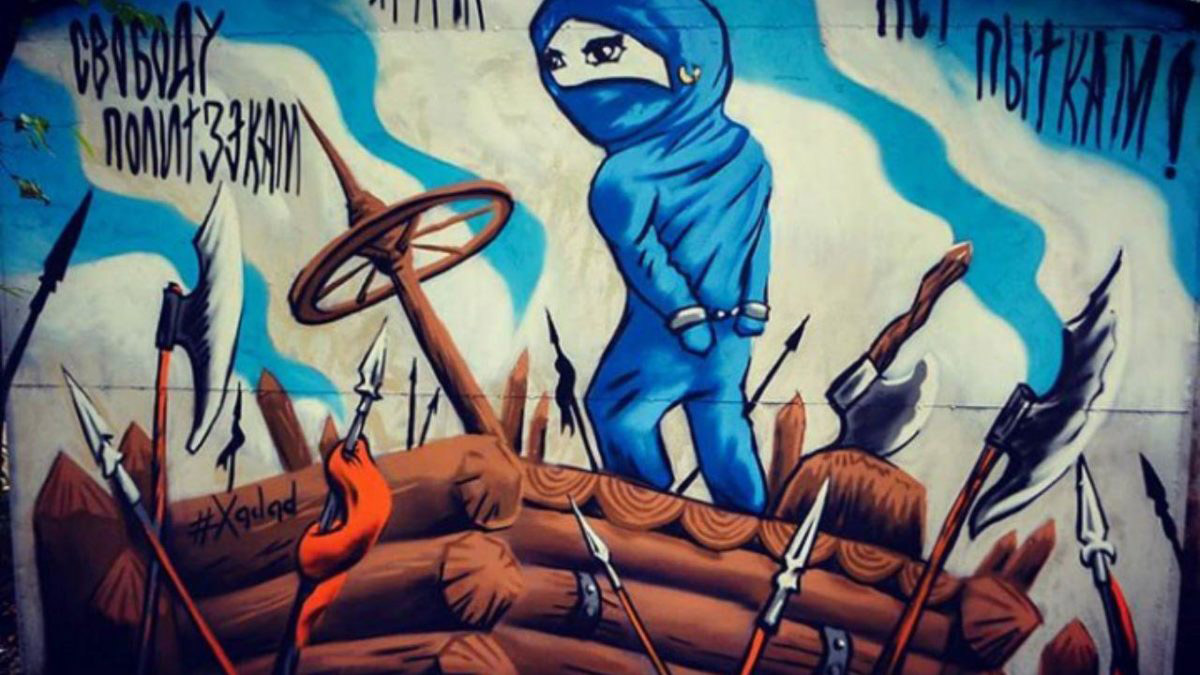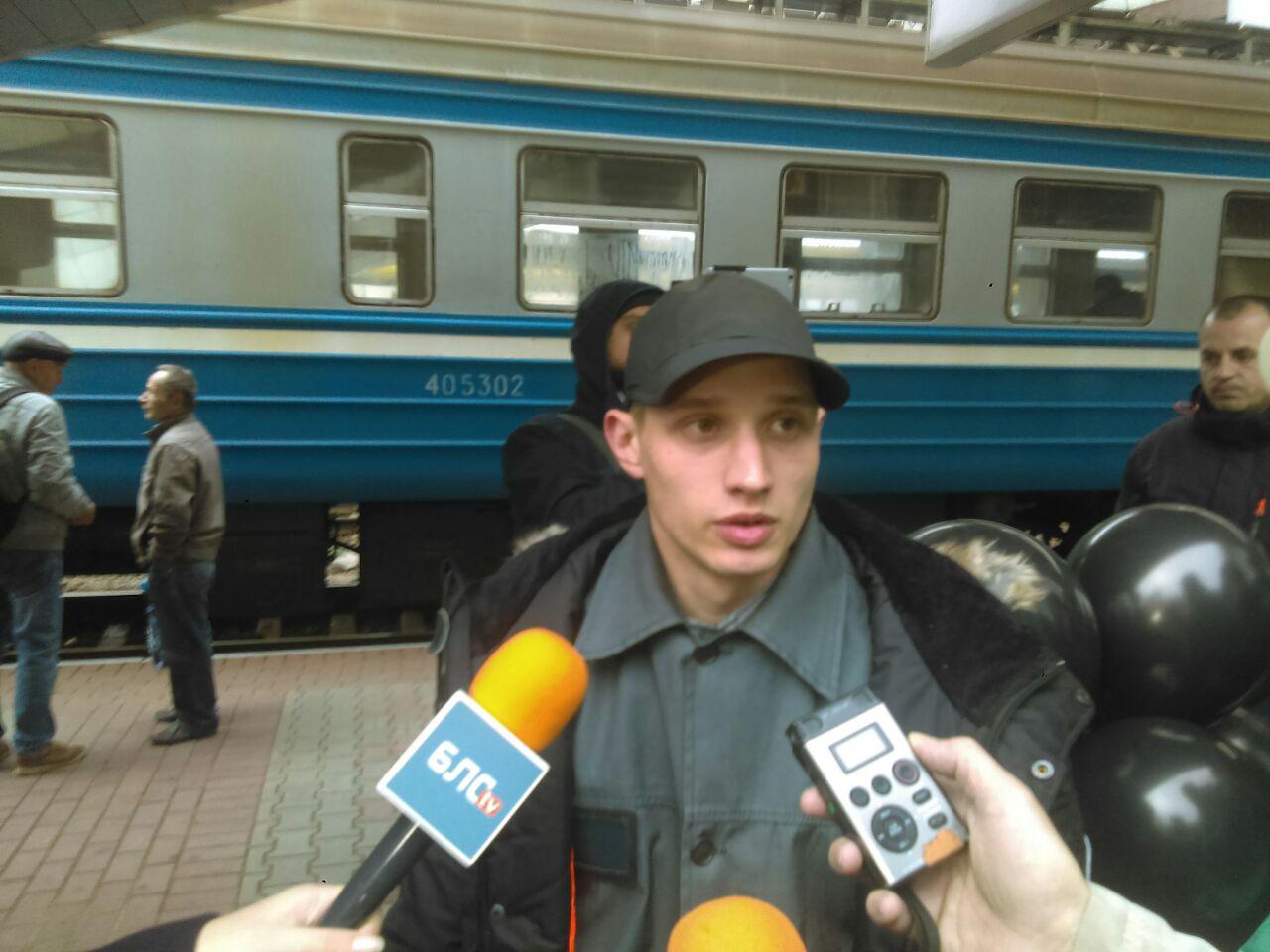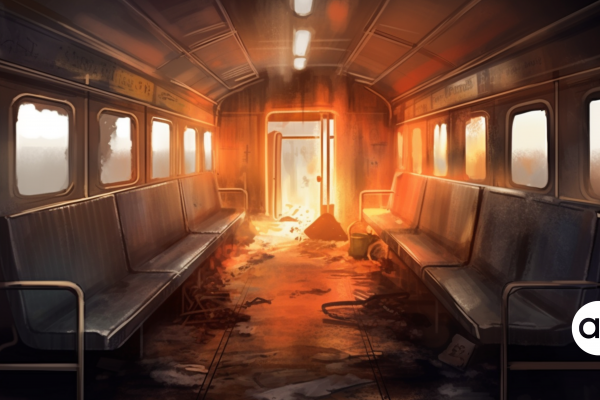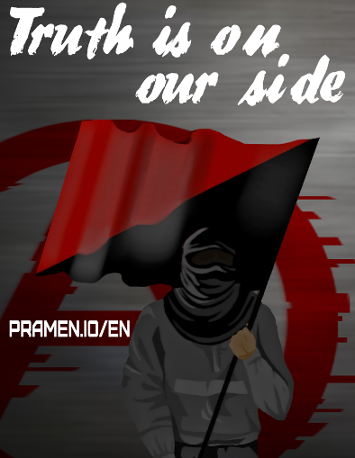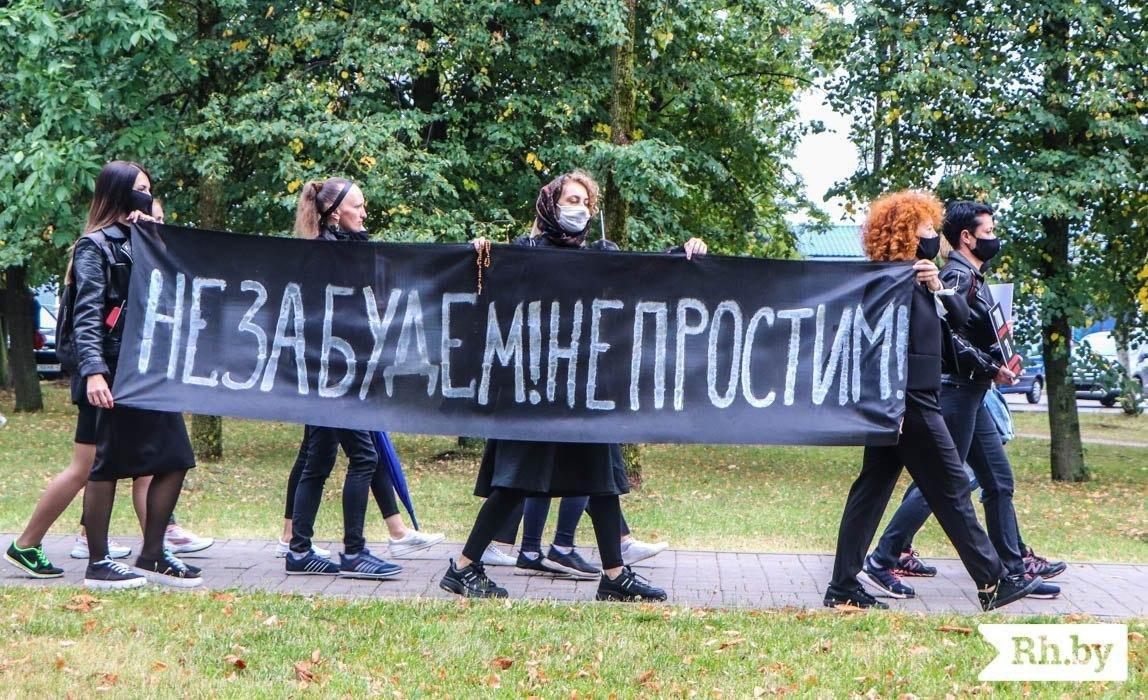We contacted our comrade, the anarchist Vlad M. after 30 days he spend in prison and talked about the detention and interesting people who you can meet at the administrative arrest. We didn’t forget to ask him about his hunger strike, as well as the situation with the coronavirus in prison.
Pramen: Vlad, hello and welcome back! How are you?!
Vlad M: Hi! Thank you. I’m fine more or less, in any case it could be much worse.
Pramen: Now, many principles of anarchist organization are used by ordinary people to fight the regime. How does this make Belarusian society anarchist and how important is decentralization in the current protests?
Vlad: Well, these principles do not yet make Belarusian society anarchist even close, but undoubtedly this movement is in the right direction and I like it. Yes, now the protest is decentralized and it has no leader. There is no such person who can be imprisoned and the protest will be immediately deflated. Previously, everything was different: the authorities were preventively detaining for example Statkevich or Severinets, people went out without knowing what to do, and that was the end of it. Today, everything is different and repression of this nature no longer works. Every protester is a leader, and for the protests to stop, the authorities will have to put everyone away, which is impossible. I think thanks to this very moment, the protests have been going on for 4 months now.
Pramen: Many liberals are already burying Lukashenko and believe that no matter what happens today, Lukashenko will stop being president anyway. What do you think about it?
Vlad: Lukashenko will stop being president anyway, it’s indisputable. Today’s protest has somewhat reduced in scale, but there are reasonable explanations for this, from the cold in the street to the covid epidemic. It would be naive to expect that the number of protesters would increase with the cold weather, and a large number of people fell ill at the same time. Very soon economic problems will be added here, and then everybody will come out on the streets, including those who have cold weather today.
Pramen: In the last few months you have been under administrative arrest for 45 days. You have never received these punishment right after the march – the arrests were carried out by punitive officers from GUBOPiKa. What do you think is the reason for such a high interest in you and other activists of the anarchist movement?
Vlad: The interest in the anarchist movement for GUBOPiKa is due to the fact that the anarchists remained essentially the only organized group on the streets. No party, movement or organization today goes out to protest in an organized way, because at one time they were defeated and their leaders were repressed. Belarusians participating in protests either go out on their own or in small groups of friends or colleagues. There is also the option of people coming out in yards and districts, but these are still unfamiliar people who do not have a certain level of trust among themselves and who may behave quite differently in certain situations. It is much more difficult to divide and detain a group that is close to each other, so the more such groups are on the streets, the harder it will be for the pigs to strangle the protest. For them, the ideal option is the complete absence of such groups, so in my opinion, that’s why the anarchists are given such close attention.
Pramen: Can you tell us a little about the last time the detention took place? How were you found?
Vlad: We met a friend of ours, who was detained right at his workplace and sentenced to 15 days of administrative arrest. Several people approached the detention center itself, while others were waiting for them in a cafe. About an hour after we all gathered for coffee and snacks, more than a dozen aggressive masked individuals broke into the facility. They threw for a second some kind of near-identification, in which it was simply impossible to see anything, and offered to follow them. Obviously, those who met their comrade near the detention facility were followed by an outside surveillance, which led them to our common meeting place.
Pramen: Was force applied to you during the detention? To other anarchists?
Vlad: This time no physical force was applied to me personally, only my hands were forced behind my back and handcuffs were put on (which were then replaced by plastic ties). Nevertheless, a comrade, who was re-arrested for another 15 days, was beaten and gassed on the territory of the police station. For these actions, the staff of the GUBOPIK specifically took him to the service car so that their actions would not get on camera.
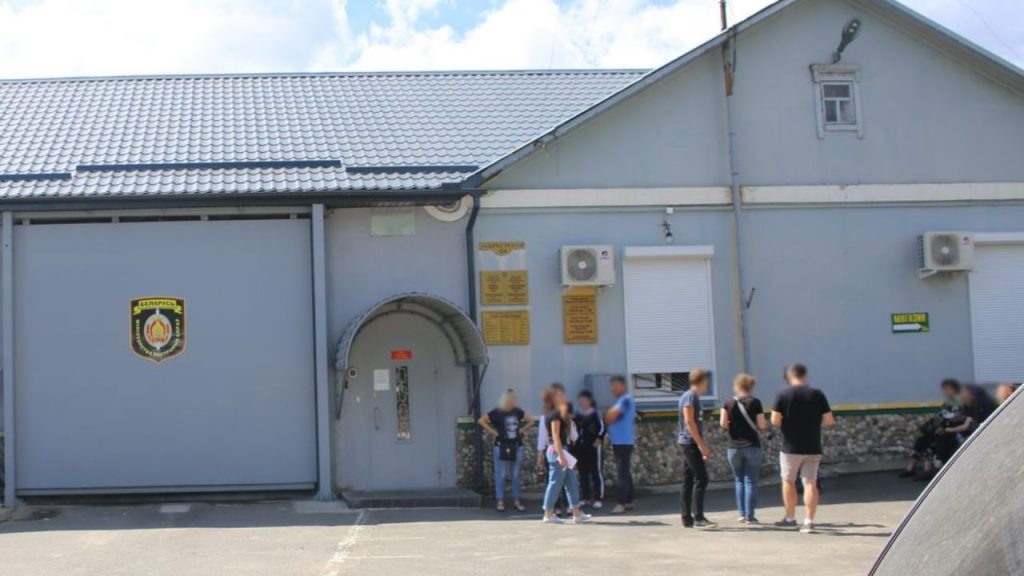
Pramen: After the first 15 days, you were held back. We heard that the Minsk GUBOPIK officers had personally come to Baranovichi. Really? And if so, why such attention to your group of detainees?
Vlad: Yes, I had a GUBOPIK employee present at the court, who had to come to the court in person to testify against us. Apparently, in the pre-trial detention center in Baranovichi for technical reasons there is no possibility to organize the so-called courts by video communication, so the so-called judges have to go from the court building to the territory of the pre-trial detention center, and the pig, as we can see, was not even more lucky – he had to go on a business trip to testify against the anarchists. It is worth noting that the words of this cop were the only “evidence” of our “offenses”. That is, without his presence, it would have been difficult to condemn us, although I would not have been surprised if his words had just been read off the paper, and the petition to question the witness would have been denied…
Pramen: Who was sitting in the cell with you? What were you talking about with your neighbors?
Vlad: Out of 30 days I spent the first 5 in Minsk on Okrestin, and the remaining 25 – in the detention center-6 in Baranovichi. There, as I understand it, all 100% of administrative detainees are political, so in any cell you can count on good company. People are a cross-section of the whole society, representatives of different ages (from 18 to 60) and different professions (from bricklayer to CEO, from doctor to engineer, from miner to IT). Conversations, of course, are first of all about protests and politics: who was detained, who was tried, who was beaten, disputes about the date when the regime finally collapses, about the effectiveness of sanctions, the adequacy of the Coordinating Council, and so on. Due to information isolation, the detainees coming later than the others have to tell about the news they have read in the last days before the detention while the others were already sitting here. I remember especially how members of the Belaruskali striking committee gave a lecture on potash mining and production, with drawings and blueprints, everything as it should be.
Pramen: Coronavirus is raging in Belarus’ prison system now. Can you tell us a little bit about your detention conditions? Were there any patients in your cell? How did the administration treat them?
Vlad: During the second part of my stay in the detention center in Baranovichi, a real epidemic broke out. At first we found out that in the neighboring cell the boy had a fever and bed regime (right in the cell, among healthy cellmates). In 3-4 days we moved to another building, and as a result, our cells were combined. This guy felt normal already, but he completely lost his sense of smell. A few more days later, having moved to a new cell, the guys asked us about our well-being and told us that they had already gotten over it all. And also about the fact that a few recently released people wrote to them in a letter that they were doing covid tests, which all were positive. After 2 days I got a sore throat and fever and after a while I also lost the sense of smell (which has not yet recovered). Administration’s attitude to this situation – the order to wear masks when the cell door opens, go to shower and walk (once or twice a week instead of daily) only with a mask. This is the end of all activities to combat covid. The maximum temperature of the paramedic’s non-contact thermometer, which he recorded in my presence, was 36.8. In most cases, the readings do not even reach 36.0.
Pramen: After being re-arrested, you went on a hunger strike. Can you explain a little why you decided to take such a radical step? How did the jailers and your neighbors feel about it in the detention center itself?
Vlad: Being in detention, when you are constantly detained, you are tried in a closed regime with a lot of procedural violations, when a pig testifies looking you in the eye, and the judge easily makes a decision without absolutely no evidence against you, it is difficult to do nothing. I found myself in a situation where GUBOPIK had full control over my life, so I have only one tool left in my arsenal to influence it. Therefore, as soon as the judge finished reading the sentence, I immediately declared that I was on hunger strike in protest against the unfair verdict of the court and in connection with political persecution. Thus, it gave me back the feeling that I could influence my life and death to some extent even while in detention. The jailers responded to this first with complete disregard, and then with petty packets like sending a parcel that came back to me to the addressee or refusing to accept letters for sending. Once there were also threats of forced feeding. The neighbors treated me with respect and support, for which I am very grateful to them. They constantly watched my physical condition, even the neighboring cell asked me every morning how I was feeling.
Pramen: How was the hunger strike for 15 days and what can you advise your friends and colleagues who are thinking of taking the same measures?
Vlad: Not exactly 15 days, but only 12 days, because I declared a hunger strike only in court, 3 days after my “second” detention. I would like to advise others to take such a decision, at least in a balanced way, and not just on emotions, because the test is more difficult than it seems at first sight. After refusing to eat, being in prison becomes much more difficult: the feeling of hunger and malaise do not allow you to concentrate on things that are great help to pass the time (reading, for example). Because of this time lasts much longer, an order of magnitude longer. Also do not expect any instant results from it, these results are likely to be absent at all or hidden from you. If you decide to go on hunger strike, it is worth talking about it as much as possible: a statement at the court, the transfer of information to freedom, a written statement to the head of the pre-trial detention facility about your hunger strike, to remind about it during each check, before each meal and in general in any convenient case. On the other hand, it is a great opportunity to test yourself for firmness and willpower, but it is worth considering that this test can not be passed and thus demoralize yourself.
Pramen: Have you received any letters or cards during the 30 days of detention? How did the news reach your “home”?
Vlad: Yes, I got letters from some comrades, but at the moment I know that at least a few letters/cards did not reach me. This is from the fact that the guys themselves were wondering if their messages came. It is impossible to calculate the total percentage of missed letters/postcards. All news were learned more from people who were detained later. I heard about all the important events that happened during my arrest while being there. Though, of course, these news came to me with some delay.
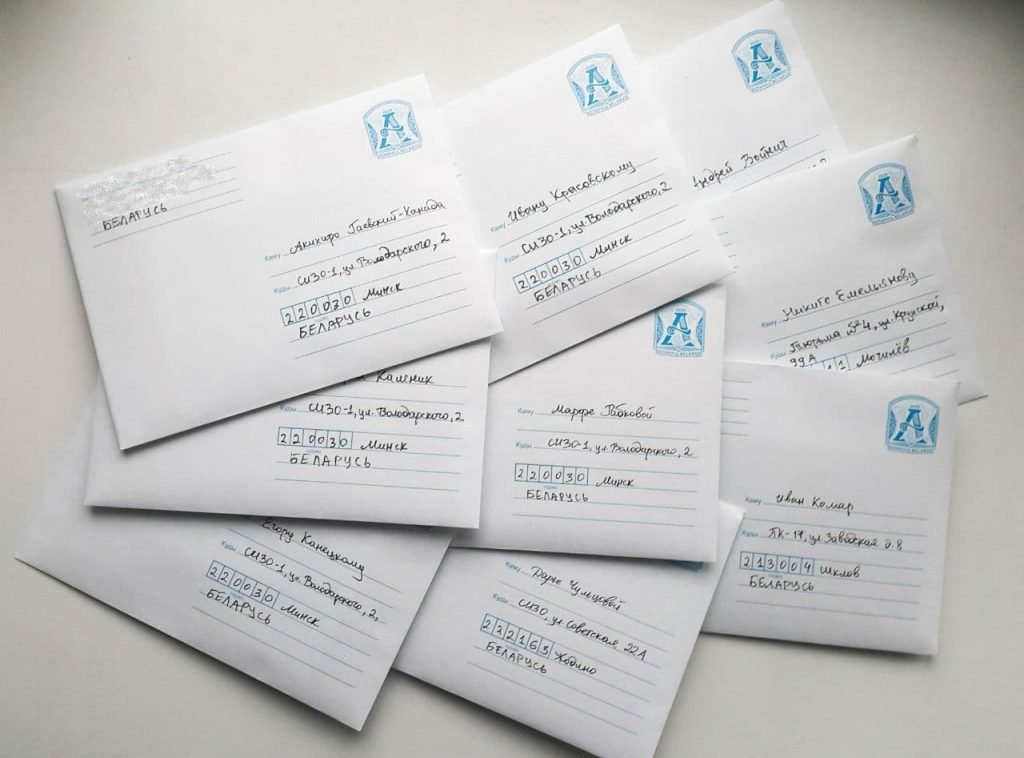
Pramen: All the prisoners are charged per day. Did you get a discount for the days of hunger strike?
Vlad: An hour before the end of my arrest I was taken to a room, something like a captress, showed a document on payment, where the full cost of “services” was specified and asked if I would sign it despite the refusal to eat. The guard who showed me the document did not know how events would develop if I refused to sign it, but it was obvious that this would be an obstacle to my timely release. I decided to put my signature under the document and an hour later was already free. But even now I don’t know if I did it right or not. In any case, I have not made the payment yet.
Pramen: How do you feel now? Did you have any problems after 24 hours?
Vlad: As of today (the third day after my release) I feel much better, although I still have a long way to go to full recovery. Every day the strength increases, but I’m still on a hard diet. The process of getting out of hunger strike is no less complicated and in terms of time it corresponds to the duration of the hunger strike. Many vital organs have switched to another mode during this period of time and now they need time to smoothly return to normal mode. In addition to all this, the sense of smell has not yet returned.
Pramen: And finally – what would you like to say or wish your comrades on the streets?
Vlad: I would like to say that we are on the right track and we are doing everything right. Repression against us is another proof of this. We must not give up or give up, everyone must continue doing what they do.
